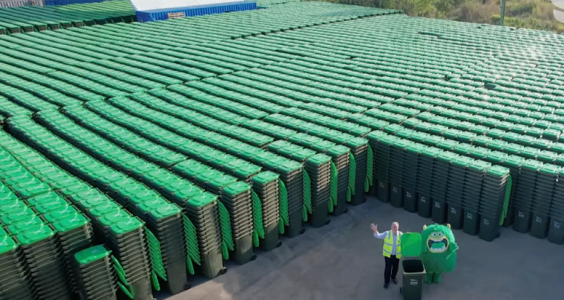Massive bin overhaul hits thousands of Aussies, residents voice concerns
By
Gian T
- Replies 22
Australia is on the cusp of a significant shift in waste management, which will affect thousands of households nationwide.
As we strive for a more sustainable future, local councils are rethinking rubbish collection, and the changes are substantial and commendable.
The City of Moreton Bay, nestled between Brisbane and the Sunshine Coast, is the latest to join this green revolution.
This rapidly developing region is gearing up for one of the largest bin rollouts in the country's history.
A staggering 116,000 residents will soon be introduced to a new garden waste collection system with a green-lidded bin (GO) designed to divert garden waste from the general waste stream.
Garden waste accounts for 23 per cent of general waste in Moreton Bay.
By redirecting this to more appropriate processing, the council anticipates reducing landfill contributions by an impressive 15,000 tonnes yearly.
This is a crucial step towards the region's ambitious goal of achieving net zero emissions by 2039.
The Queensland government has backed this initiative, committing a substantial $9.6 million to assist the council in rolling out the garden organics collection service.
This is just the first phase, with plans for a Food Organics and Garden Organics (FOGO) bin collection to follow, contingent on the availability of a suitable processing facility in the area.
‘City of Moreton Bay's new garden organics (GO) collection service will start from 2 December 2024.’ the council announced.
‘Eligible residents will receive a 240-litre garden organics bin with a lime green lid.’
‘The service will move us towards a circular economy model of reuse, reduce, and recycle.’
Importantly, residents can opt out of the service if they wish, and the introduction of the GO bins is not expected to disrupt the weekly red-bin collections.
Social media has been abuzz with images of the thousands of bins ready for distribution.
Although environmental advantages are widely celebrated, some residents have raised practical concerns about storage space for the additional bins.
‘For those of us that have no room left for these bins. Can we leave them on the footpath?’ a woman asked.
‘Good to know people on 3000m blocks don’t have any green waste,’ another echoed.
This overhaul is part of a broader trend, with councils across Australia adjusting their bin systems and collection routines.
Victoria, for instance, recently introduced a unique purple bin, while NSW's Inner West Council faced backlash for proposed changes to their FOGO bin collection frequency, leading to an opt-in service for weekly collections.
In other news, Sydney's Inner West residents are baffled by recent bin changes, resulting in bin caddies intended for indoor use being mistakenly left on the curb.
The mix-up has entertained and frustrated locals, who criticise the council for poor communication. You can read more about it here.

Are you in favour of the new waste management systems? How will they impact your daily routine? Feel free to share your stories and opinions with us in the comments below.
As we strive for a more sustainable future, local councils are rethinking rubbish collection, and the changes are substantial and commendable.
The City of Moreton Bay, nestled between Brisbane and the Sunshine Coast, is the latest to join this green revolution.
This rapidly developing region is gearing up for one of the largest bin rollouts in the country's history.
A staggering 116,000 residents will soon be introduced to a new garden waste collection system with a green-lidded bin (GO) designed to divert garden waste from the general waste stream.
Garden waste accounts for 23 per cent of general waste in Moreton Bay.
By redirecting this to more appropriate processing, the council anticipates reducing landfill contributions by an impressive 15,000 tonnes yearly.
This is a crucial step towards the region's ambitious goal of achieving net zero emissions by 2039.
The Queensland government has backed this initiative, committing a substantial $9.6 million to assist the council in rolling out the garden organics collection service.
This is just the first phase, with plans for a Food Organics and Garden Organics (FOGO) bin collection to follow, contingent on the availability of a suitable processing facility in the area.
‘City of Moreton Bay's new garden organics (GO) collection service will start from 2 December 2024.’ the council announced.
‘Eligible residents will receive a 240-litre garden organics bin with a lime green lid.’
‘The service will move us towards a circular economy model of reuse, reduce, and recycle.’
Importantly, residents can opt out of the service if they wish, and the introduction of the GO bins is not expected to disrupt the weekly red-bin collections.
Social media has been abuzz with images of the thousands of bins ready for distribution.
Although environmental advantages are widely celebrated, some residents have raised practical concerns about storage space for the additional bins.
‘For those of us that have no room left for these bins. Can we leave them on the footpath?’ a woman asked.
‘Good to know people on 3000m blocks don’t have any green waste,’ another echoed.
This overhaul is part of a broader trend, with councils across Australia adjusting their bin systems and collection routines.
Victoria, for instance, recently introduced a unique purple bin, while NSW's Inner West Council faced backlash for proposed changes to their FOGO bin collection frequency, leading to an opt-in service for weekly collections.
In other news, Sydney's Inner West residents are baffled by recent bin changes, resulting in bin caddies intended for indoor use being mistakenly left on the curb.
The mix-up has entertained and frustrated locals, who criticise the council for poor communication. You can read more about it here.
Key Takeaways
- Dozens of councils across Australia are changing their rubbish collection systems to be more sustainable, implementing FOGO bins to reduce waste.
- The City of Moreton Bay is set to distribute 116,000 green-lidded garden organics (GO) bins to residents, one of the country's largest bin rollouts.
- The council's new service aims to reduce landfill by 15,000 tonnes per year and support their goal for net zero emissions by 2039.
- There has been some public concern regarding the number of bins required for the different waste types, with some residents questioning the storage feasibility and collection frequency changes.








